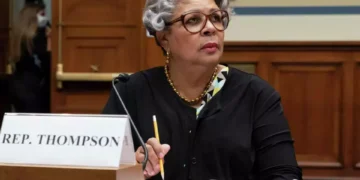Feb 14, 2025 Story by: Editor
A key question in assessing political representation is whether representatives from majority-Black districts secure more federal resources for Black constituents compared to those from Black influence districts.
Following the 2000 Census, the Democratic-controlled Georgia legislature passed a redistricting plan that was backed by many black leaders because it would have spread black voters and influence across several districts rather than concentrating them in a select few. Georgia’s Republican governor objected to the plan because he said it violated the Voting Rights Act of 1965, which discourages the dilution of minority voting strength. The U.S. District Court for the District of Columbia rejected the legislature’s plan.
Georgia’s 1997 State Senate districting plan is the benchmark plan for this litigation. That plan drew 56 districts, 11 of them with a total black population of over 50%, and 10 of them with a black voting age population of over 50%. The 2000 census revealed that these numbers had increased so that 13 districts had a black population of at least 50%, with the black voting age population exceeding 50% in 12 of those districts. After the 2000 census, the Georgia General Assembly began redistricting the Senate once again.
It is uncontested that a substantial majority of Georgia’s black voters vote Democratic, and that all elected black representatives in the General Assembly are Democrats. The Senator who chaired the subcommittee that developed the new plan testified he believed that as a district’s black voting age population increased beyond what was necessary to elect a candidate, it would push the Senate more toward the Republicans, and correspondingly diminish the power of African-Americans overall.
Thus, part of the Democrats’ strategy was not only to maintain the number of majority-minority districts and increase the number of Democratic Senate seats, but also to increase the number of so-called “influence” districts, where black voters would be able to exert a significant-if not decisive-force in the election process.
The new plan therefore “unpacked” the most heavily concentrated majority-minority districts in the benchmark plan, and created a number of new influence districts, drawing 13 districts with a majority-black voting age population, 13 additional districts with a black voting age population of between 30%-50%, and 4 other districts with a black voting age population of between 25%-30%.
When the Senate adopted the new plan, 10 of the 11 Black Senators voted for it. The Georgia House of Representatives passed the plan with 33 of the 34 black Representatives voting for it. No Republican in either body voted for the plan, making the votes of the black legislators necessary for passage. The Governor signed the Senate plan into law in 2001.
This study argues that examining distributive policy decisions—where legislative coalitions often extend broadly—provides a stronger framework for evaluating the effectiveness of Black-majority versus Black influence districts.
Majority-Black districts are those in which African Americans comprise more than 50% of the population, whereas Black influence districts have a 25–50% Black population. By analyzing how these representatives navigate federal project allocations, this research seeks to shed light on the broader implications of district composition in shaping legislative outcomes for Black communities.
In a 5-4 opinion delivered by Justice O’Connor, the Court held that the District Court failed to consider all the relevant factors when it examined whether Georgia’s Senate plan resulted in a retrogression of black voters’ effective exercise of the electoral franchise.
The Court reasoned that Georgia likely met its burden of showing nonretrogression under section 5 of the Voting Rights Act because the District Court focused too narrowly on certain districts without examining the increases in the black voting age population that occurred in many of the other districts and improperly rejected evidence that the legislators representing the benchmark majority-minority districts support the plan.
In his dissent, Justice David H. Souter argued that Georgia had failed to carry its burden.
Source: Justia

















